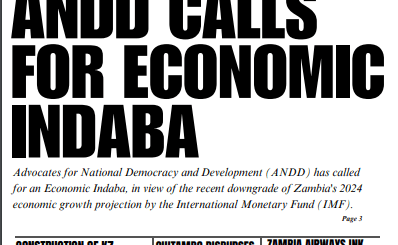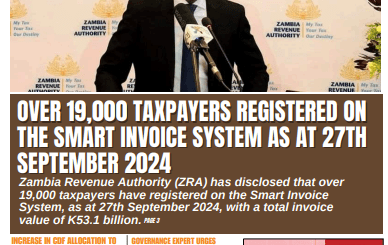The Need For A Modern Public Transport System
Public transport in Zambia, once a relatively functional system, is now falling behind, especially when compared to other African countries like Tanzania and Kenya. For years, Zambians have relied on small, informal mini-buses to service major roads.
However, these buses now contribute to congestion, inefficiency, and a subpar commuting experience that significantly impacts the country’s productivity and economic growth.
One of the most glaring problems associated with Zambia’s public transport system is the congestion caused by the overwhelming number of mini-buses that dominate our roads. Instead of reducing traffic, these small buses increase the number of vehicles on our roads, leading to a scenario where traffic jams are the norm, particularly during rush hours.
The vehicles often park haphazardly on already narrow roads, creating chaos. This congestion costs commuters countless hours that could otherwise be spent working or engaging in productive activities. The situation is exacerbated by the poor condition of many of these buses, which are old, poorly maintained, and prone to breaking down, further compounding traffic delays.
In addition to the logistical failures, the environment in which this public transport system operates is highly unhygienic. Many of Zambia’s bus stations are in disrepair, with heaps of uncollected garbage and a lack of basic facilities such as clean waiting areas or restrooms.
The filth that permeates these stations is a clear indication of mismanagement and neglect, and it tarnishes Zambia’s image as a growing economy. Instead of being places where commuters can comfortably wait for their transportation, these stations have become symbols of urban decay and government inaction.
Furthermore, the conduct of those who operate this transport system leaves much to be desired. Bus drivers and conductors are frequently rude and unprofessional, with no apparent understanding of customer service.
This fosters an environment of hostility and frustration for passengers, who, despite paying for the service, are subjected to insults, reckless driving, and often, disregard for their safety. Public transport should be a space where citizens feel respected and valued, not one where they must endure mistreatment.
The time is ripe for Zambia to rethink and overhaul its public transport system. If we look at regional examples, such as Tanzania and Kenya, there are practical lessons we can adopt to modernize our system.
Both nations have transitioned from smaller mini-buses to larger, commuter buses that can carry 80 to 100 passengers per trip. This shift has significantly reduced the number of vehicles on the road, alleviating traffic congestion and improving the overall efficiency of their transport systems.
In addition to introducing larger buses, countries like Tanzania and Kenya have implemented dedicated expressways and bus lanes, which are exclusively reserved for public transport vehicles.
These lanes ensure that buses do not compete with private cars, improving the flow of traffic and reducing the temptation for buses to park recklessly. Zambia would benefit immensely from adopting similar measures.
The creation of bus-dedicated lanes would not only reduce congestion but also encourage more people to opt for public transport over private vehicles, thereby reducing the number of cars on the road.
Currently, Lusaka only has two major expressways running across the city, which is insufficient to handle the growing population and vehicular load.
Imagine a scenario where we construct a new expressway running from Makeni, through town, all the way to Mandevu, passing key transit hubs like Lumumba Road and Matero.
Another expressway could be built from the airport roundabout through Kaunda Square, with connections to major roads like Great North Road and Great East Road. These expressways would feature dedicated lanes for buses, minimizing traffic disruptions and improving overall commute times.
The benefits of modernizing Zambia’s transport infrastructure go beyond just reducing congestion. It would have a profound impact on the economy, as people would spend less time stuck in traffic and more time engaged in productive activities.
Commuters would also benefit from safer, more reliable transport options. Moreover, modern infrastructure would reduce the wear and tear on Zambia’s roads, potentially saving millions in road maintenance costs.
As we have seen in Nairobi, which was once infamous for its congestion, such transformations are not only possible but also incredibly effective.
However, despite the obvious benefits, Zambia has failed to make these necessary improvements. The primary obstacle has been political interference.
Many of the mini-buses currently on the road are owned by politicians or those with strong political connections. As a result, there has been resistance to passing laws that would outlaw smaller buses in favor of larger, more efficient public transport options.
A similar situation exists with the country’s long-distance transport sector, where rail transport would be more efficient. However, many truck owners—some of whom are influential politicians—are opposed to the expansion of rail infrastructure, as it would threaten their profits.
This conflict of interest has stalled necessary reforms that would benefit the broader public.
What Zambia desperately needs is political will and commitment to prioritize public interest over personal gain.
The current state of our transport system is not just an inconvenience; it is a significant impediment to our productivity and overall national development. The loss of man-hours due to traffic jams is a serious economic issue that requires immediate action.
Zambia can no longer afford to ignore the urgent need for a modern public transport system. The evidence is clear—countries like Tanzania and Kenya have successfully tackled their congestion issues by implementing modern, efficient transport systems that serve the public good.
Zambia must follow suit by embracing larger buses, dedicated expressways, and laws that prioritize public transport infrastructure over private interests. Only then can we hope to see a transport system that supports, rather than hinders, Zambia’s economic growth and the well-being of its citizens.








